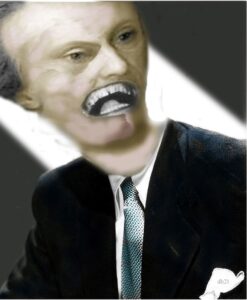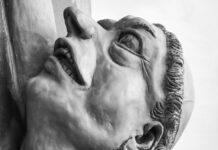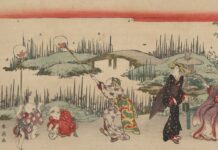I am not an algorithm, not a computer program, not coding. I am a vessel of stories. I hear the children laughing. I hear the horses hooves. And the mothers screaming. The joy and the horror. I am the Sun King sleeping under the hill. The dead President of Camelot. The flesh swinging from the crucifix.
- The Man From Bourges 591 A.D.
His name was Ernie. It is said that Ernie walked into a woods where he was set upon by a horde of flies. Ernie went mad and stayed in this state for two years. Once he had cleared his mind, Ernie claimed to all who would hear him that he had super powers, prophecy and healing. He performed miracles which garnished him a large and loving following. He loved it when they worshipped him, he and his female companion. Her name was Jocelyne of Kirk. And she was a beauty. People would bring him gold and jewellery which he would distribute among his followers. Later he organized these followers into a band and they would rob and kill those they met on the road.
And then things took a turn for the worst in a town called Le Pugh. He had quartered his followers in the local basilica and threatened to kill the local Bishop if he did not worship him. The Bishop was not pleased. He sent a group of soldiers to meet Ernie. The head soldier, Walter, threw himself on the ground as if to worship Ernie, then grabbed him around the knees while his fellow soldiers hacked Ernie to pieces. Ernie didn’t expect that. Then they took Jocelyne of Kirk, who had renamed herself Mary, stripped her naked and tortured her for hours. Her sorrowful voice could be heard for miles. Some said she was singing.

(Everyone likes a tune. Makes the passing of the day more pleasant. Sometimes Billy and I break into a cacophony of whistling. Or deep Gregorian chants.) Billy and I sweep the streets for the unfortunates. Victims of the plague. We take the bodies we find and toss them on the wagon, take them outside of town, pile them high, crisscrossing each other like firewood. And set them on fire. I love the smell of bacon. And then Billy and I might sit there and imagine what these poor souls were like in their secular lives. Billy is a sentimental type and thinks that they are all going to heaven to join their loved ones. I have a different view. Death is like falling over a cliff into an infinite black hole. I don’t believe in hell. People do horrible things but why should they be tortured forever? My God is not a sadist… The Black Death. Makes me laugh. Everyone has such a long face. You’ve got to make the best of the hand you’re dealt.)
- Pope Urban II 1095 A.D.
Urban the Second was better known as Herb. Herb came from French nobility. The first issue he had to deal with as Pope was his arch-enemy Clement III or as his mother called Clement Three.
Herb liked to dance, especially the fashionable dance of the time called ‘the walk to Canossa’, originally choreographed by Greg the Seven. Three was a thorn in Herb’s side. And then Three died in what was said to be unusual circumstances… old age.
Now that Three had passed on, Herb was free to pursue his passion. He gave a telling speech on 27 November 1095 at the conclusion of the Council of Clermont. He summoned the Christian world to rid the Holy Lands of the Seljuk Turks. Any man who went on a crusade would be forgiven for all past and all future sins. ‘It is the will of God.’ Let the slaughter begin. Herb II died on July 29, 1099, two weeks after the fall of Jerusalem. He choked on a wish bone.

(There were a lot of laughs during the Crusade. Me and my mates had been kicked out of England. For being Scottish. And the beating of Englishmen. And women. But it was all in good-natured fun. So we marched south through France and then Italy. Honestly I could not understand a word people said. Spoke too fast. Doug, whom I’d known since childhood, got himself hung. For frigging a Bishop’s mistress. She wasn’t good looking. Scars on her legs and the like. That was a tough day for Doug.
Then we finally reached Antioch. The air was hot. The sand was sharp. And the women were ripe for the plucking. We lay on the beach for several weeks taking in the sun. Drinking margaritas. I did some surfing. What a strange sensation that was.
Finally the day came when started to move. One town we entered was defended by teenage boys. We slaughtered them all. It was disgusting. They put up no defence. Some of them weren’t even boys. Girls dressed up as boys. Old ladies dressed up as boys. Ah, most of them were children. Fresh off the teat. I’m not proud of it. I didn’t sleep well that night. A bit of indigestion. I’m not used to the spicy food.
And then there was Jerusalem. Seven weeks of siege. Playing cards all day. Wrestling challenges. Greasing the pig. Anything to pass the time. It put us all in a surly mood. When we breached the walls we slaughtered everyone inside. Some claimed they were Christians but how could you tell. Christian, Moslem, Jew. They’re all the same.)

- 22 April 1724 Immanual Kant
It was said that the merchants of Königsberg set their clocks by the passage of Kant across their doorsteps. When he died his head was measured and found to be extraordinarily large. Like a tulip bulb. Heinrich Heine was very fearful of Kant describing Kant’s ideas as ‘world crushing thoughts’. He called Kant the Robespierre of philosophy. Kant believed that the the objects of experience are mere “appearances”, and that the nature of things as they are in themselves is consequently unknowable to us. That’s a fine how do you do. We were back in the darkness, inside the mind of Descartes, before consciousness. In the womb. We were no better than vermin.
In 2005 the University of Königsberg was renamed The Immanuel Kant State University of Russia in a ceremony attended by Chancellor Gerhard Schroder of Germany, and the President of Russia, Vladimir Putin.
On his death bed Kant was asked if he wanted a pillow. He replied, “Es ist gut (It is good)” Most of what you have read may or may not be accurate.
- January 2, 1941 Boogie Woogie Bugle Boy
He was a famous trumpet man from out Chicago way
He had a boogie style that no one else could play
He was the top man at his craft
But then his number came up and he was gone with the draft
He’s in the army now, a blowin’ reveille
He’s the boogie woogie bugle boy of Company B
Songwriters: Don Raye / Hughie Prince
Boogie Woogie Bugle Boy lyrics © Universal Music Publishing Group

A world wide hit. The Andrew Sisters, three little girls from Minneapolis Minnesota. Started toot tooting their way to the top. The song was sung by guards in the concentration camps. Picked up by the inmates. When Hitler caught his knee tapping to the rhythm he had the song banned.
(I fell asleep inside your nightmare. And forgot how to wake up. The rooms were filled with dust. The light coming in through the windows. Voices muttering. Unintelligible. Rats scurrying among the feet of children. A church for the beast. And then someone started to sing, “God is mad!”)
- Roger Vadim, March 12, 1407
Roger Vadim was born brain dead. He grew up unable to speak, talk, laugh. He walked with a limp. There was no light in his eyes. But he was useful to his family, as a mule is useful. And he was incredibly strong. When he was twenty six years old, his mother fell down the well. She wasn’t found until the next day. Roger’s father took to drink. And then his children started to leave the homestead. Roger stayed on the farm and starved. According to neighbours he collapsed on a Sunday afternoon and was thought to be dead. When he opened his eyes he started to scream. He was buried alive in a pine box. It was only years later when a new owner of the farm dug up the grave sight to make room for his own family that they found Roger’s coffin. And the scratch marks inside. And the story he managed to write with his blood on the sheet he had been wrapped in. It was the story about the world. Roger Vadim believed that God was brain dead. We were living in the fantasy stories he created to keep himself amused.

(I cite the story of Roger Vadim because he has a right to his version of reality. We all have that inalienable right. Dare I say, it’s a human right. Sanity is a version of insanity that the majority supports. Reality is a consensus. In Roger Vadim’s mind he was God. God as an idiot.
I don’t see it that way. I agree with Descartes. Rene thinks therefore I am. What is the alternative to being conscious?
But how can we prove that this isn’t all a charade? That none of this is real?
But God wouldn’t do that to us.
Maybe your God wouldn’t! But mine, a real nasty bugger, has been laying a real trip on me and mine.
If this was my dream, my wife would have a boob job and I wouldn’t be bald.
Somebody write that down.
I believe that what Vadim is onto is that God has not woken up yet. He is still dreaming. Still creating his version of reality. But he will wake and know himself for the first time. And then shut the whole thing down.
We are writing the code for that as we speak.
Then God is a computer program, an algorithm, a recipe in a cook book!
Gentlemen we’re getting off our main topic. Let me repeat the topic of the day. Where are we going for dinner?)
He puts the boys asleep with boogie every night
And wakes ’em up the same way in the early bright
They clap their hands and stamp their feet
Because they know how he plays when someone gives him a beat
He really breaks it up when he plays reveille
He’s the boogie woogie bugle boy of Company B
Songwriters: Don Raye / Hughie Prince
Boogie Woogie Bugle Boy lyrics © Universal Music Publishing Group
About the Author
David Halliday has published poems, short stories, plays, art works in reviews and publications across the United States and Canada including murder by Coach House Press, winner of the 2001 Eppie for poetry. Church Street is Burning was a finalist in the 2002 Eppie for poetry. Sleeping Beauty, published by LTD ebooks.com was a finalist in the 2003 Dream Realm Awards and a winner of the 2004 IP Book Awards. In 2007 he was short listed for the C.B.C. Poetry Contest.
















